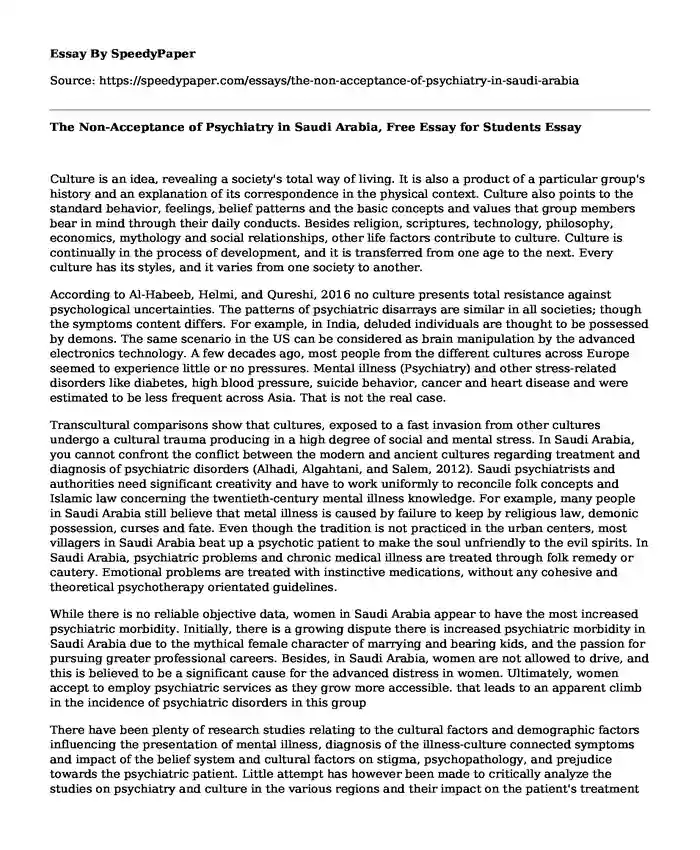
| Type of paper: | Literature review |
| Categories: | Culture Psychology Mental health |
| Pages: | 3 |
| Wordcount: | 619 words |
Culture is an idea, revealing a society's total way of living. It is also a product of a particular group's history and an explanation of its correspondence in the physical context. Culture also points to the standard behavior, feelings, belief patterns and the basic concepts and values that group members bear in mind through their daily conducts. Besides religion, scriptures, technology, philosophy, economics, mythology and social relationships, other life factors contribute to culture. Culture is continually in the process of development, and it is transferred from one age to the next. Every culture has its styles, and it varies from one society to another.
According to Al-Habeeb, Helmi, and Qureshi, 2016 no culture presents total resistance against psychological uncertainties. The patterns of psychiatric disarrays are similar in all societies; though the symptoms content differs. For example, in India, deluded individuals are thought to be possessed by demons. The same scenario in the US can be considered as brain manipulation by the advanced electronics technology. A few decades ago, most people from the different cultures across Europe seemed to experience little or no pressures. Mental illness (Psychiatry) and other stress-related disorders like diabetes, high blood pressure, suicide behavior, cancer and heart disease and were estimated to be less frequent across Asia. That is not the real case.
Transcultural comparisons show that cultures, exposed to a fast invasion from other cultures undergo a cultural trauma producing in a high degree of social and mental stress. In Saudi Arabia, you cannot confront the conflict between the modern and ancient cultures regarding treatment and diagnosis of psychiatric disorders (Alhadi, Algahtani, and Salem, 2012). Saudi psychiatrists and authorities need significant creativity and have to work uniformly to reconcile folk concepts and Islamic law concerning the twentieth-century mental illness knowledge. For example, many people in Saudi Arabia still believe that metal illness is caused by failure to keep by religious law, demonic possession, curses and fate. Even though the tradition is not practiced in the urban centers, most villagers in Saudi Arabia beat up a psychotic patient to make the soul unfriendly to the evil spirits. In Saudi Arabia, psychiatric problems and chronic medical illness are treated through folk remedy or cautery. Emotional problems are treated with instinctive medications, without any cohesive and theoretical psychotherapy orientated guidelines.
While there is no reliable objective data, women in Saudi Arabia appear to have the most increased psychiatric morbidity. Initially, there is a growing dispute there is increased psychiatric morbidity in Saudi Arabia due to the mythical female character of marrying and bearing kids, and the passion for pursuing greater professional careers. Besides, in Saudi Arabia, women are not allowed to drive, and this is believed to be a significant cause for the advanced distress in women. Ultimately, women accept to employ psychiatric services as they grow more accessible. that leads to an apparent climb in the incidence of psychiatric disorders in this group
There have been plenty of research studies relating to the cultural factors and demographic factors influencing the presentation of mental illness, diagnosis of the illness-culture connected symptoms and impact of the belief system and cultural factors on stigma, psychopathology, and prejudice towards the psychiatric patient. Little attempt has however been made to critically analyze the studies on psychiatry and culture in the various regions and their impact on the patient's treatment and diagnosis.
References
Al-Habeeb, A., Helmi, B., & Qureshi, N. (2016). Mental and Social Health Atlas: An update,
Ministry of Health, Saudi Arabia, 2015. International Neuropsychiatric Disease Journal, 6(3), 1-20.
Alhadi, A., Algahtani, H., & Salem, M. (2012). Cognitive behaviour therapy in the middle east:
1. In F. Naeem & D. Kingdon (Eds.), Cognitive behaviour therapy in non-western cultures (1st ed., pp. 93-101). New York: Nova Science Publisher Inc.
Cite this page
The Non-Acceptance of Psychiatry in Saudi Arabia, Free Essay for Students. (2022, Mar 28). Retrieved from https://speedypaper.net/essays/the-non-acceptance-of-psychiatry-in-saudi-arabia
Request Removal
If you are the original author of this essay and no longer wish to have it published on the SpeedyPaper website, please click below to request its removal:
- Free Essay Example: Same-Sex Relationships are Normal
- Essay Sample on Clinical Information System
- Free Paper Sample on the Importance of Disarmament, Demobilization, and Reintegration
- Essay Sample that Comprises Electronic Health Records System Presentation
- Essay Sample on Planned Parenthood Funding
- Paper Example: Current Process
- Paper Example on Teenagers' Hearing Loss: The Risk of Headphone Use
Popular categories




